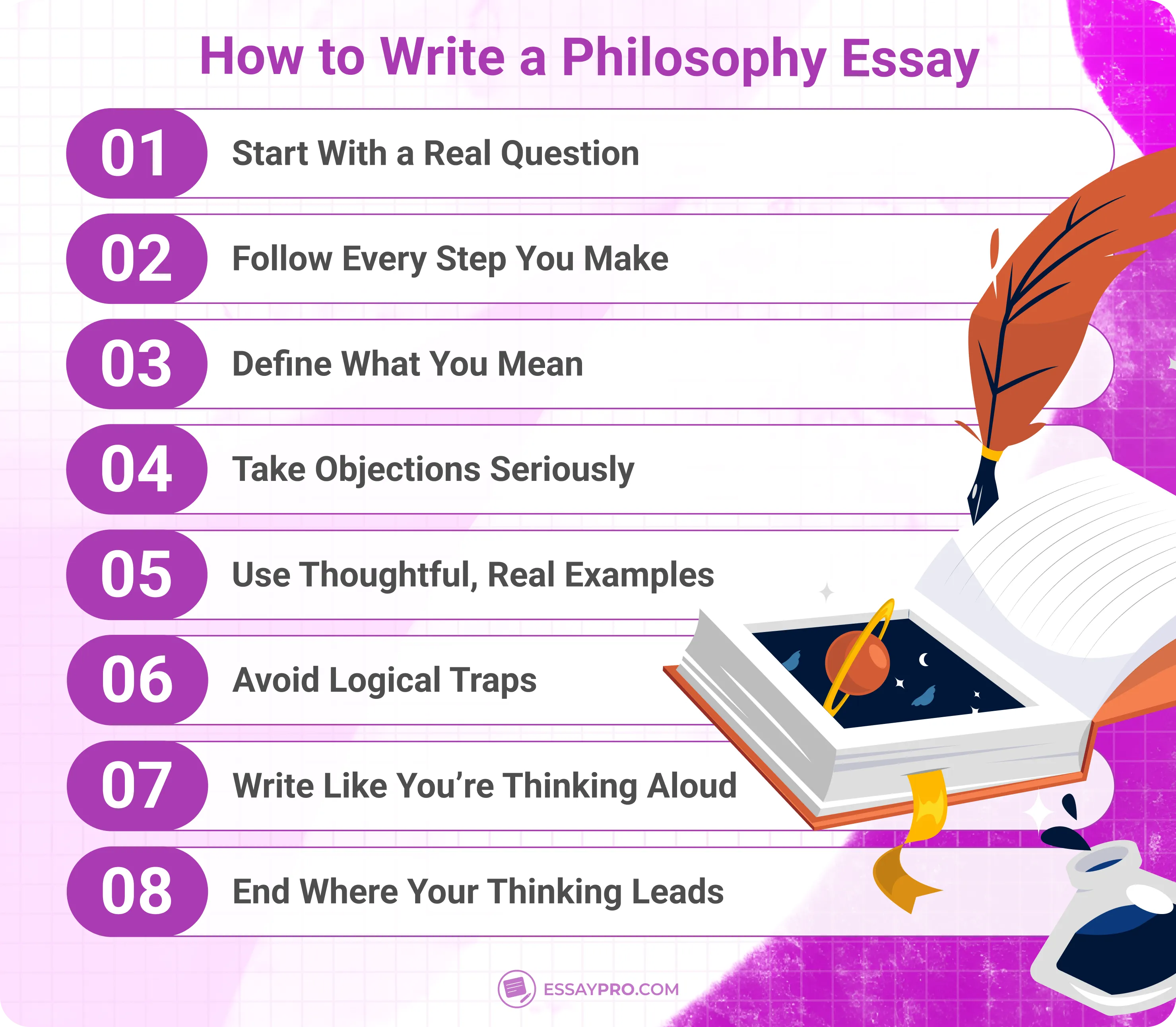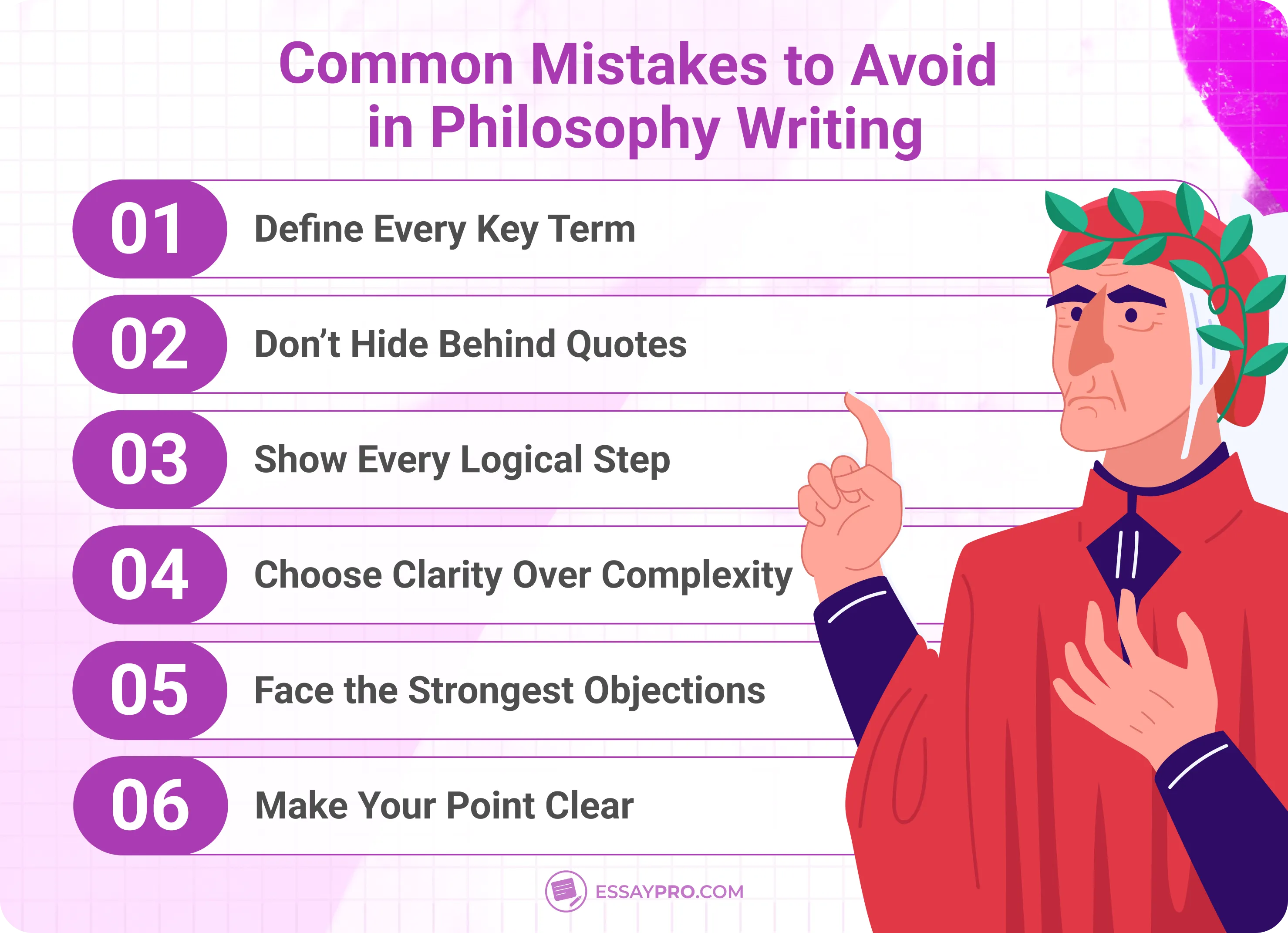Either consciously or subconsciously, we try to avoid thinking without shortcuts. A philosophy essay tells you to do something entirely opposite of that. It asks you to trace a question to its roots and sit with the discomfort of not knowing, until something begins to form.
This guide won’t hand you answers. It’ll show you how to write a philosophy essay that wrestles with real problems and argues without shallow confidence. From structure to philosophy essay format to examples that actually mean something, everything here is built to help you write like you’re part of the conversation.
And if the thinking gets messy and a philosophy paper is hanging midair, EssayPro is here with writers who know how to translate questions into arguments and arguments into essays.
What Is Philosophy Essay?
An essay about philosophy is where you take a big, difficult question and try to work through it by thinking clearly and carefully. You are, by no means, giving your opinion or repeating what others have said. You pick a claim, break it down, and follow the argument wherever it goes. You’re trying to understand something about truth, existence, right and wrong, or how we know what we know. The writing has to be clear, but the thinking has to go deep. It’s less about being right and more about being honest with your reasoning.
What's Philosophy Essay Length
A typical philosophy essay is around 1,500 to 2,000 words, though shorter essays may be 1,000 and longer ones up to 3,000. However, see whether you have an assigned word limit before getting started. If it's shorter or longer than we recommend, stick to that word limit when writing your essay on philosophy.
How to Write a Philosophy Essay
Don’t try to perform intelligence. Philosophy essays aren’t about performance. You need to show your thinking, clear and honest, and sit with questions that most people rush past.
Here's how to write something that does more than just check the boxes.

Begin With a Problem You Care About
‘All men by nature desire to know... it was through wonder that men now and at first began to philosophize.’
According to Aristotle, philosophy starts where certainty ends and astonishment begins. What are you most curious about? What unsettles you? Is it time, justice, motion, purpose, or even being itself? In today’s world, questions about how AI is shaping ethics also fit into this timeless pursuit of understanding what it means to be human. All of these questions aren’t self-explanatory (otherwise, philosophy would lose its meaning). If your question doesn’t bother you, it probably won’t move anyone else.
Don’t Just Make a Point. Follow It.
Philosophy isn’t about bold claims, that is, for the students, because philosophers are often fierce when stating their ideas. It’s about slow, careful steps. Make a claim, then ask yourself why it matters. What does it assume? What would happen if it were false? Keep digging until you reach the foundation or the crack.
Each paragraph should feel like it needs to be there. Don’t add filler. Don’t decorate. Just build your case like you’re talking to someone who truly wants to understand you.
Define Everything. Nothing Is Obvious.
Words like truth, good, mind, self, purpose, freedom, and reality don’t mean one thing in philosophy. You can’t assume your reader agrees with your version. Spell it out. If you say ‘justice,’ explain what you mean by it before you argue for it. Philosophy depends on definitions, and without them, even smart arguments fall apart.
Respect the Other Side
A strong philosophical essay never pretends there’s no disagreement. After all, that disagreement is why you’re arguing about some idea in the first place. Anticipate the best objections, not the weakest. Let the other side speak fully. Then answer it without arrogance. If your response doesn’t feel satisfying, maybe you need to adjust your own claim.
Use Examples That Help You Think
Philosophy isn’t abstract for the sake of it. Examples are where ideas hit the ground. Use them to test your claim. Real-life dilemmas, thought experiments, and contradictions aren’t decorations. They’re tools to push the argument further.
A reductio ad absurdum - reduction to absurdity. Test your idea. Try imagining what it would lead to if taken to its extreme. Would it collapse? Then something’s off. Does your argument assume what it’s trying to prove? That’s circular reasoning, which philosophy calls begging the question. You have to know the traps and avoid them.
Keep the Voice Clear, Not Distant
It’s easy to fall into robotic language or academic fog.
- Don’t.
A philosophy essay should sound like one person thinking carefully out loud. You don’t need to sound formal. You need to sound precise. Say what you mean. Mean what you say. And if you’re unsure, say that, too. Doubt, when honest, is part of the process.
Don’t Wrap It Up Like a School Paper
Philosophy often offers no closure. Don’t end with ‘in conclusion’, because when it comes to philosophy, it’s really not easy to conclude anything. Here’s how to conclude a philosophy paper: show where the thinking brought you. Maybe your claim holds up. Maybe it shifted. Maybe new questions opened. A good ending doesn’t shut the door. It leaves it slightly ajar.
Additionally, whether your recommended reading includes Dante's Divine Comedy or Albert Camus’ Myth of Sisyphus, approach your sources with curiosity and analytical thinking.
Philosophy Essay Structure
Just like any other essay, a philosophy essay’s general structure consists of introduction, main body, and conclusion. But what goes deep within is quite different from other types of writing. There are some specifications you need to follow to guide the reader through your thinking without losing them halfway in. Each part serves a different purpose: to define, argue, challenge, and refine.
Here’s a detailed structure:


Philosophy Essay Outline
Just like you would expect, a philosophy essay doesn’t follow a formula. It follows a thought. But still, an outline helps you a lot with slowing down, seeing what holds your argument together or falls apart.
Here’s how you can organize your mind and build your essay from the inside out:
Introduction
Begin with the problem, not just the topic, but what bothers you about it. Is there a contradiction you can’t shake? A claim that feels wrong but is hard to disprove? Set the stage by showing what’s at stake.
The introduction should provide answers to these questions:
- What’s the exact question you’re exploring?
- Why is it important?
- What will your essay try to prove or explain?
Define the Ground You’re Standing On
Philosophy breaks down when people don’t define their terms. Before you argue, explain what you mean by the key ideas. If you're writing about justice, freedom, identity, or knowledge, make sure the reader knows exactly how you're using the word.
Build Your Argument Brick by Brick
Now it’s time to make your case. Think of it as laying out stepping stones: each claim should move the reader closer to your conclusion without jumping too far.
- Start with your strongest reason
- Break it into clear steps
- Make sure each step follows from the last
- Avoid assumptions; if it matters, explain it
Let the Other Side Speak
No serious philosophical essay ignores the counterpoint. Ask yourself: What would someone thoughtful say to challenge me? Then, present the objection fully and fairly, and don’t make it weak on purpose.
Respond Without Dodging
Now that you’ve listened, respond. You can:
- Explain why the objection fails
- Show where the reasoning goes wrong
- Or even revise your original claim slightly, if the objection lands
Test It With Examples
Abstract claims feel stronger when they’re tested. You can use a real case, a thought experiment, or a story, and show how your idea works when applied to real situations. Examples challenge you to be clearer.
End Where the Thinking Leads
Don’t write a fake conclusion. Instead, reflect.
- What did your argument actually show?
- Did your thinking shift along the way?
- What questions remain?
Philosophy rarely ends in certainty. A good ending shows the reader where your mind landed and where the conversation might go next.
Philosophy Paper Format
Writing a philosophy paper is about building a piece of writing that helps your ideas stand up to pressure. Structure matters, but what matters more is the clarity and honesty of your thinking. Here’s what to keep in mind:
Reductio ad Absurdum: Reduction to Absurd
This is when an idea breaks itself. You test a claim by showing that, if it were true, something absurd would follow.
Example:
Claim: 'If everyone should do what makes them happy, anything is morally fine.'
Response: 'So if someone enjoys harming others, it’s okay? That’s clearly wrong.'
That absurd result shows the original idea can’t hold.
Question-Begging Arguments: The Illusion of Reasoning
These arguments look like logic, but loop back on themselves.
Example:
'Stealing is wrong because it’s immoral.'
You’re just repeating the claim. There’s no actual support, just circular logic.
Follow Conventions That Keep Thinking Clear
- Use first-person if it helps: 'I will argue...' is better than awkward detachment.
- Stick to the present tense: say 'Descartes argues,' not 'argued.'
- Avoid filler phrases like 'I believe' or 'In my opinion.'
- Format cleanly: double spacing, readable font, proper citations.
Philosophical Essay Example
Sometimes, it’s easier to understand philosophy writing by seeing it in action. That’s why we’ve put together two short examples to show you what a clear, thoughtful philosophical essay actually looks like in practice.
If these philosophy essay examples speak to you and you’re thinking, ‘I wish my paper looked like that,’ you’re not alone. Good news: you can simply leave a write my philosophy paper request and get expert help from EssayPro. This sample is just a glimpse of what our writers can do. When you’re ready for a paper that goes even deeper, we’ve got you covered.
The Challenges of Philosophical Writing
Writing philosophy requires working through problems that don’t offer easy solutions. It asks you for more than just opinions or arguments. Below are three main challenges faced by students:
- Clarity in the Middle of Uncertainty: Philosophical questions are messy by nature. Still, your writing can’t be. The challenge is learning how to express something complicated without losing your reader or even yourself. You’re trying to be clear about things that aren’t clear at all.
- Showing the Work: Good philosophical writing doesn’t skip steps. If a conclusion seems obvious to you, you still need to show how you got there. You’re building trust with your reader, one careful step at a time. If the reasoning breaks, the whole argument does too.
- Taking Objections Seriously: It’s not enough to explain what you think. You also have to ask: What would someone else say? And not the weakest version of that view, but the strongest one.
If you’re feeling overwhelmed with these challenges, ask us, ‘write my paper’, and we’ll take care of the rest.
Common Mistakes to Avoid in Philosophy Writing
These six mistakes below show up in all kinds of student essays, not because people aren’t trying, but because philosophy asks for a kind of writing we’re not used to. Here’s what to watch out for.
- Not explaining what your key terms actually mean and tossing around words like 'truth,' 'good,' or 'reality. '
- Letting famous philosophers carry your argument and not showing your own thinking. A quote should support an idea you’ve already made clear, not do the thinking for you.
- Leaving out the in-between steps of how you got from one point to the next
- Trying to sound deep instead of being clear and writing long, dense sentences
- Avoiding objections and not facing the strongest arguments against your idea
- Writing without a clear point and not letting the reader know where exactly you’re going and why it’s important

Final Thoughts
Philosophy essays have value when, rather than repeating what others have said, you’re asking really hard questions and working your own way through them. If you ever feel stuck, though, EssayPro is here to help. You can buy online essay from writers who know how to turn complex ideas into clear writing.
Don’t Just Quote Philosophers.
Need help? Our writers are trained to write with depth and purpose.
FAQs
How Long Should a Philosophy Essay Be?
It’s usually between 1,500 and 2,000 words, but it depends on the topic.
How to Write a 1000 word Philosophy Essay?
Keep it focused with a clear question, a strong claim, and two or three solid points.

Daniel Parker
is a seasoned educational writer focusing on scholarship guidance, research papers, and various forms of academic essays including reflective and narrative essays. His expertise also extends to detailed case studies. A scholar with a background in English Literature and Education, Daniel’s work on EssayPro blog aims to support students in achieving academic excellence and securing scholarships. His hobbies include reading classic literature and participating in academic forums.
- Harvard College Writing Program. (n.d.). A Brief Guide to Writing the Philosophy Paper. Harvard University. https://hwpi.harvard.edu/files/hwp/files/bg_writing_philosophy.pdf
- Faculty of Philosophy, University of Cambridge. (n.d.). How to Write a Philosophy Essay. https://www.phil.cam.ac.uk/system/files/documents/phil-essay-guide.pdf







